Bald Cypress is a hygrophyte, and its native environment is wetland or swamp. It also has some common characteristics of hygrophyte. For example, old trees often have buttress root at the base of the trunk, which extend like triangular wings. The structure is formed by the secondary growth of the lateral roots close to the surface. In addition to allowing the roots to breathe on the ground and absorb nutrients from the ground, it also has the functions of supporting the huge tree body to avoid toppling and preventing soil loss. Bald Cypress also has respiratory roots, that is, roots that grow upward and protrude from the ground, especially in wetlands and swamps. Bald Cypress can also be planted on ordinary land, but the respiratory roots are not so obvious well. Black mangrove (Avicennia marina) which is a mangrove plant is one of the typical examples of respiratory roots.
The leaves of Bald Cypress look like pinnate compound leaves with many leaflets growing alternately on the rachis. In fact, its leaves are linear single leaves. What look like leaf rachis are actually small branchlets called twigs. When the leaves fall in winter, the twigs and the leaves above them will turn reddish brown and fall together. It looks like a piece of feather leaves falling off, hence Bald Cypress is called "落羽杉" in Chinese.
The flowers of Bald Cypress are unisexual, monoecious. Female flowers are solitary or in clusters of 2 on the top of branches, very small and hard to see with the naked eye. Male inflorescences are slender and long catkins. The male inflorescences are born on the top of the branches and are drooping. The light green color makes them looks like leaves, usually few people pay attention to them. Bald Cypress blooms in late fall to winter before losing its leaves. Flowers are pollinated in early winter. Immediately after pollination, the pistil encounters severe winter and grows very slowly. It slowly grows into a fruit on the branch and takes a year to mature. No wonder, except for the plants whose leaves have fallen in the cold winter, almost whenever you see Bald Cypress, there will always be some cypress hanging on the tree.
Bald Cypress
(2019.12.28 Taiwan)
About Bald Cypress
| ◆ | Classification: Genus Taxodium; Family Cupressaceae | |
| ◆ | Scientific name: Taxodium distichum (L.) A. Rich | |
| ◆ | Chinese name: 落羽杉、落羽松、美國水杉、美國水松 | |
| ◆ | English Name: Bald Cypress, Swamp Cypress, Deciduous Cypress, Common Cypress, Southern Cypress, Gulf Cypress, Black Cypress | |
| ◆ | Origin: Southeastern United States | |
| ◆ | Growth environment: Wetlands, swamps | |
| ◆ | Growth habit: Deciduous large tree which grows in wetland | |
| ◆ | Height: Up to 50 meters in the original place | |
| ◆ | Stem | |
| 》 | Trunk upright, diameter up to 5 meters in the original place | |
| 》 | Trunk taper large, and the trunk base is enlarged | |
| 》 | Bark brown or reddish brown, often has long strips of flakes or fibrous deep fissures | |
| 》 | Old trees often have buttresses and respiratory roots. The respiratory roots are woody, cylindrical, with a pointed or round top, growing upward and protruding from the ground, especially in wetlands and swamps | |
| 》 | Branches spread horizontally | |
| ◆ | Leaf | |
| 》 | Single leaf, alternately arranged in two rows on the twigs to form a pinnate shape, twigs about 5-10 cm long | |
| 》 | Lleaf linear, flat, about 1-1.5 cm long, about 0.1 cm wide; sessile, base obtuse, twisted on twigs, apex acute; entire | |
| 》 | Upper surface bright green; lower surface greenish white | |
| 》 | Midrib concave on upper surface and raised on lower surface; each side with 4 to 8 stomata | |
| 》 | Leaves turn reddish brown in winter before falling | |
| ◆ | Flower | |
| 》 | Flowers unisexual, monoecious | |
| 》 | Male flower →The male inflorescence is a catkin, slender and pendulous, born on the top of the branch →Male cones ovate, yellow-green; each flower consists of 6 to 8 stamens, and each stamen has 4 anthers |
|
| 》 | Female flower →Female cones solitary or in clusters of 2, attached to the tops of branchlets →Each female cone is composed of many carpels arranged in imbricate shape, and each carpel has 2 ovules |
|
| ◆ | Fruit: | |
| 》 | Cone round or oval, about 2.5 cm in diameter; green at the beginning, light red, dark red, purple-brown or light yellow-brown when mature, with white powder on the surface | |
| 》 | Fruit scales 10-12 pieces, woody, peltate, wrinkled on the surface, with 2 seeds in each fruit scale | |
| 》 | Seeds unequal triangles, about 0.5 to 1.2 cm long, slightly wedge-shaped, angular, brown | |
| ◆ | Flowering and fruiting period: The flowering period is from late autumn to early winter, pollination in early winter, and the fruit takes about 12 months to mature; the fruit ripening period is about October of the next year | |
The bald cypress is native to the southeastern United States. At present, it is widely planted as a landscape plant all over the world.
In many places, you can see the bald cypresses planted into a forest, and when their leaves fall in winter, it presents a beautiful reddish-brown landscape, attracting a large number of tourists.
Bald Cypress
(2019.12.28 Taiwan)
In Taiwan, people also like to plant Bald Cypress around urban buildings.
Bald Cypress
(2020.2.28 Taiwan)
Bald cypress is a large deciduous tree with a plant height of up to 50 meters in the original place.
Bald Cypress
(2018.3.1 Taiwan)
The trunk is upright, the shape of the tree is sharp and conical when it is young, and it is broad and conical when it is old.
Bald Cypress
(2019.1.26 Taiwan)
The bark is brown or reddish brown.
The bark often has long strips of flakes or fibrous deep fissures.
Bald cypress is a wetland plant. Its original environment is wetland or swamp. Old trees, like some wetland trees, often have buttress root.
Buttress root of Bald Cypress
(2018.1.23 Taiwan)
Bald cypress has upward-growing respiratory roots (also known as knee roots). Respiratory root (air root or pneumatophore) is a metamorphosis root. For plants that grow in swamps or watersides or intertidal zones for a long time, due to the lack of air in the soil, the roots have difficulty breathing. Some plants will grow roots that grow up from the back and expose the ground, which are called respiratory roots. Respiratory roots have well-developed ventilation tissues. Their epidermis has lenticels that can absorb more air. When admiring a bald cypress, don't forget also to observe its respiratory roots.
Respiratory root (knees) of Bald Cypress
(2018.1.23 Taiwan)
The respiratory root of bald cypress is woody, cylindrical, with a pointed or round top, growing upwards and protruding from the ground, especially in wetlands and swamps.
Respiratory root (knees) of Bald Cypress
(2018.1.23 Taiwan)
The bald cypress planted on ordinary ground also has respiratory roots, but they are much smaller.
Bald cypress loses its leaves in winter and sprouts new leaves on the branches in spring.
Leaves of Bald Cypress
(2020.3.18 Taiwan)
Leaves of Bald Cypress
(2020.3.18 Taiwan)
Leaves of Bald Cypress
(2020.3.18 Taiwan)
The leaves are single leaves, which are alternately arranged in two rows on the twigs to form a pinnate shape, and the twigs are about 5 to 10 cm long. In winter, they turn from green to brown and fall off so they are called winter falling twigs. The twigs are alternate on the persistent branches, and sometimes there are a few leaves at the base of the persistent branches.
branches and twigs of Bald Cypress
(2020.5.6 Taiwan)
Leaves of Bald Cypress
(2020.5.6 Taiwan)
Leaf upper surface bright green; lower surface greenish white; midrib concave on upper surface and raised on lower surface; each side with 4 to 8 stomata.
Leaves of Bald Cypress
(2020.5.6 Taiwan)
Leaves of Bald Cypress
(2020.5.6 Taiwan)
The leaves turn reddish brown in winter before falling.
Leaves of Bald Cypress
(2018.12.12 Taiwan)
The leaves of Bald Bald Cypress grow alternately on the twigs. In winter, the leaves and twigs fall together.
Fallen leaves of Bald Cypress
(2018.12.12 Taiwan)
Flowers are unisexual, monoecious.
Male inflorescence of Bald Cypress
(2018.10.19 Taiwan)
The male inflorescence is a catkin which is born on the top of the branch.
Male inflorescence of Bald Cypress
(2018.10.19 Taiwan)
The male inflorescences are slender and pendulous.
Male inflorescence of Bald Cypress
(2021.1.2 Taiwan)
Bald Cypress blooms in early winter before its leaves drop.
Male inflorescence of Bald Cypress
(2021.1.2 Taiwan)
There are many male inflorescences, but they are usually hung on the upper part or even the top of the plant, and the color is not bright, which can not attract people's attention. Most people usually look at Bald Cypress only after its leaves change color.
Male inflorescence of Bald Cypress
(2021.1.2 Taiwan)
The male inflorescences grow on the top of the tree and look like dry branches and leaves after withering.
Male inflorescence of Bald Cypress
(2021.1.2 Taiwan)
Occasionally, some male inflorescences grow lower, so you can observe them closely.
Male inflorescence of Bald Cypress
(2020.12.12 Taiwan)
Male inflorescence of Bald Cypress
(2020.12.12 Taiwan)
Male cones are ovate, yellow-green; each flower consists of 6 to 8 stamens, and each stamen has 4 anthers.
Male cones of Bald Cypress
(2020.12.12 Taiwan)
Female cones are solitary or in clusters of 2, attached to the tops of branchlets.
Female cones of Bald Cypress
(2020.12.12 Taiwan)
Female cones of Bald Cypress
(2020.12.12 Taiwan)
Female cones of Bald Cypress
(2020.5.1 Taiwan)
Female cones of Bald Cypress
(2020.5.1 Taiwan)
Female cones of Bald Cypress
(2020.5.1 Taiwan)
The fruit is a cone. The fruit period is quite long. It takes about 1 year to mature after pollination.
Female cones of Bald Cypress
(2019.6.8 Taiwan)
The cone is round or oval, about 2.5 cm in diameter.
Female cones of Bald Cypress
(2019.3.2 Taiwan)
Female cones of Bald Cypress
(2019.3.2 Taiwan)
Female cones of Bald Cypress
(2019.3.2 Taiwan)
The cone opens automatically when it is ripe.
Female cones of Bald Cypress
(2020.2.18 Taiwan)
The seeds are unequal triangles, about 0.5 to 1.2 cm long, slightly wedge-shaped, angular and brown.




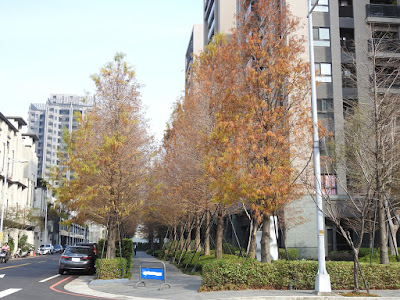
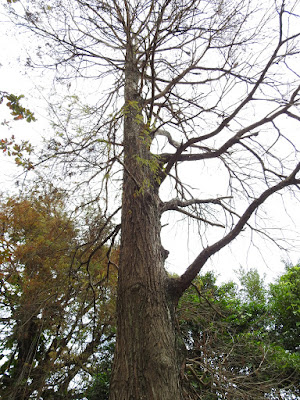
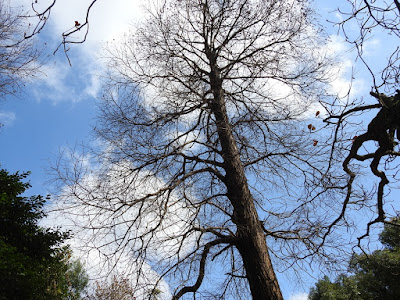





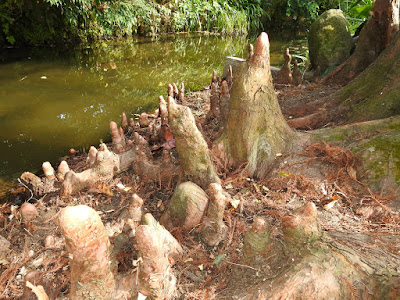


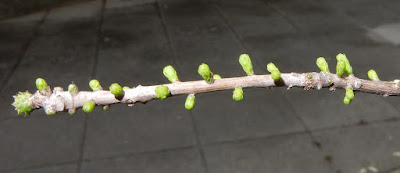
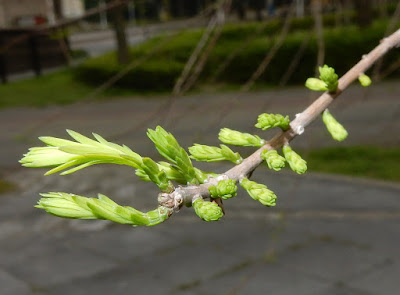
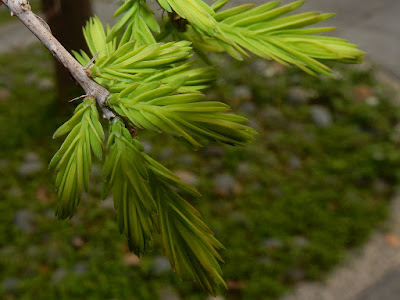
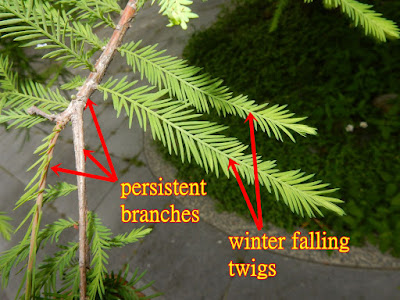
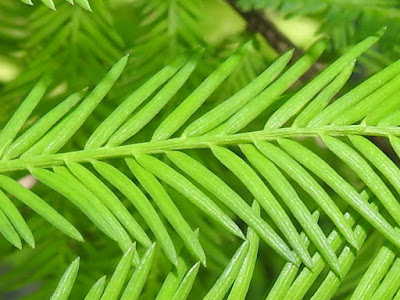
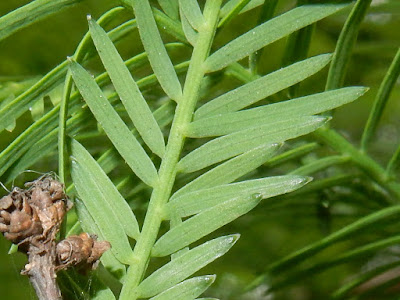

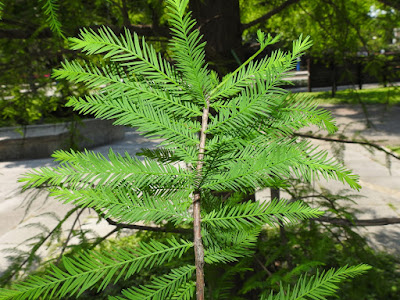
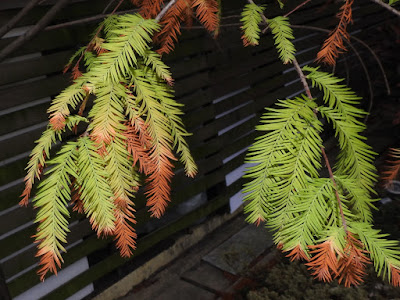
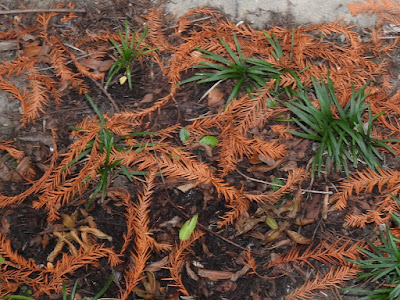
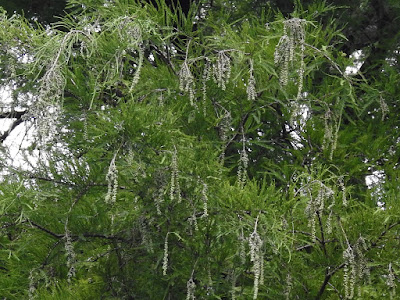
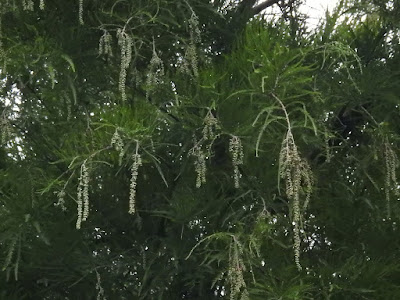




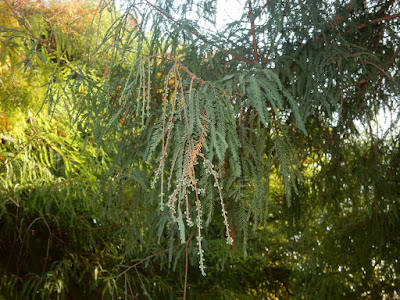
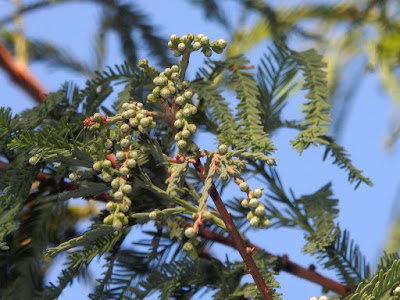

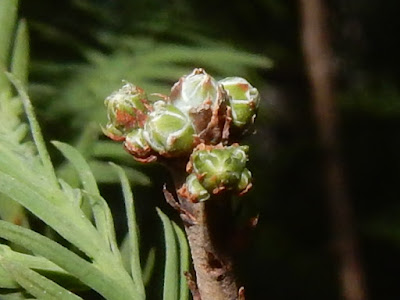
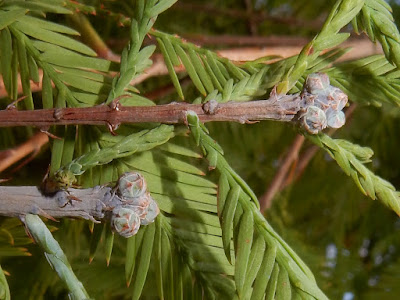
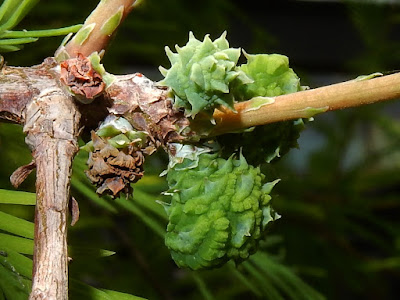
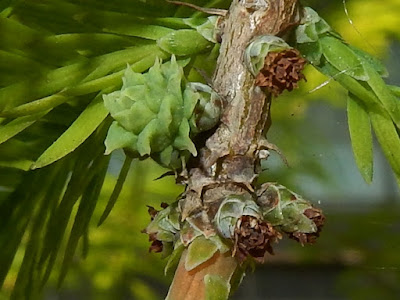



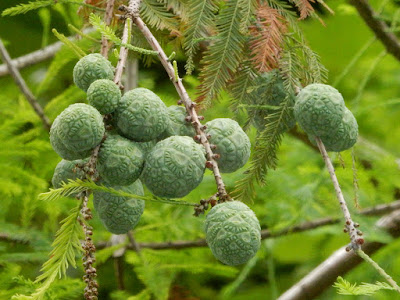






沒有留言:
張貼留言